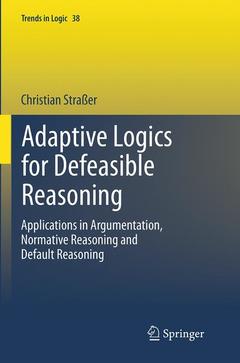Description
Adaptive Logics for Defeasible Reasoning, Softcover reprint of the original 1st ed. 2014
Applications in Argumentation, Normative Reasoning and Default Reasoning
Trends in Logic Series, Vol. 38
Author: Straßer Christian
Language: English
Keywords
abnormality-based reasoning; abstract argumentation; adaptive logic; conditional logics of normality; default logic; defeasible modus ponens; defeasible reasoning; deontic conflicts; deontic logic; deontic paradox; diachronic defeasibility; dynamic proofs; nonmonotonic logic; plausible reasoning; preference semantics; reasoning on the basis of uncertainty; selection semantics; standard format for adaptive logics; synchronic defeasibility
Publication date: 08-2016
Support: Print on demand
Publication date: 12-2013
438 p. · 15.5x23.5 cm · Hardback
Description
/li>Contents
/li>Biography
/li>Comment
/li>
This book presents adaptive logics as an intuitive and powerful framework for modeling defeasible reasoning. It examines various contexts in which defeasible reasoning is useful and offers a compact introduction into adaptive logics.
The author first familiarizes readers with defeasible reasoning, the adaptive logics framework, combinations of adaptive logics, and a range of useful meta-theoretic properties. He then offers a systematic study of adaptive logics based on various applications.
The book presents formal models for defeasible reasoning stemming from different contexts, such as default reasoning, argumentation, and normative reasoning. It highlights various meta-theoretic advantages of adaptive logics over other logics or logical frameworks that model defeasible reasoning. In this way the book substantiates the status of adaptive logics as a generic formal framework for defeasible reasoning.
Presents adaptive logics as an intuitive and powerful framework to model defeasible reasoning
Features intuitive examples and case studies
Details a range of applications that will appeal to researchers with various interests and backgrounds
Includes supplementary material: sn.pub/extras




